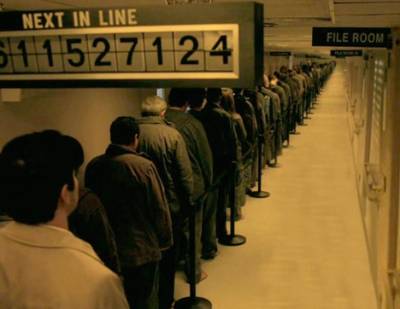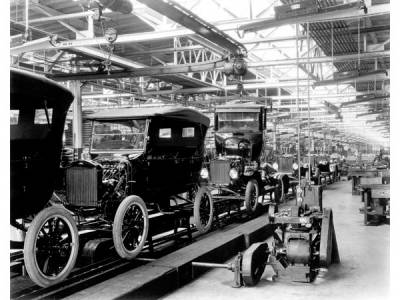
Standing in line at the DMV, applying for a business permit, trying to fix a pothole or trying to contact the right government agency—what do all of these situations have in common? In most cities, they are inefficient and frustrating. Though these processes and the people leading them are well-intentioned, the processes themselves are typically inefficient and stuck in a bygone era in which things had to be done in person and information was tracked on paper.
Automation = Efficiency
“Efficiency” sometimes has a negative connotation, such as in the “Work smarter not harder” comment in this Dilbert comic, because it often means that you are doing the job of several people and you just need to “make it work.” The definition of efficiency is the “accomplishment of a job with minimum expenditure of time and effort.” Employing systems that make your job easier and more efficient allow you to focus on the more enjoyable aspects of your job. A great example of transforming an industry through efficiency is when Henry Ford transformed the assembly line manufacturing processes in the beginning of the 20th century to make the Model T car assembly process more efficient, bringing a reliable car to the average American.

Fast-forward to today’s connected, digital, mobile world where even average Americans can track our online purchases from order to delivery, increase productivity on Evernote or collaborate through Google Docs. We are certainly making our everyday lives easier—we should be able to make government processes easier and more efficient as well. Much like Henry Ford, Accela is also now in a sense transforming an industry to bring efficiency to our government processes. And much like the Model T, we are also bringing a reliable system to agencies across America.
So that begs the question: how are we doing it?
Efficiency = The Civic Platform
Accela improves government processes through the Civic Platform. Our core product—originally called Automation—has now expanded its capabilities to become the Civic Platform, which offers a growing number of solutions that help connect government to citizens. Our Automation processes are the proven technology that has been used by hundreds of customers for 20+ years, and we continue to innovate and grow our ecosystem.
The Civic Platform is all about driving efficiencies. By streamlining processes and communication and bringing information online and to the cloud, the overarching benefit is the ability to spend your time connecting with citizens and improving your community.
Accela’s Top Five
Here are a few examples of ways the Civic Platform can help make processes more efficient by streamlining manual or inefficient activities:
1. Eliminating paperwork
If rolls and rolls of physical paper or folders full of Excel and Word documents are commonplace in your department, you aren’t in the minority. When needing to adhere to agency policies and strict regulatory requirements, the files pile up quickly.
For example, when cross-referencing documents from multiple reviewers for architectural drawings and consolidating all feedback, not only is this time-consuming, but it is also very inefficient. In addition, these documents need to be stored somewhere. While it may be hard for some to imagine this scenario given our digital age, it is not uncommon.
With the Civic Platform, you can effectively eliminate the mounds and mounds of paperwork. For example, watch the video demo on Electronic Document Review—a powerful feature that enables real-time review and side-by-side analysis a reality, making the elimination of paperwork a reality.
2. Streamlining service delivery
The process of filling out paperwork for permits and inspections is often done in person, on weekdays, during office hours. Not only is this a time-consuming and frustrating experience for citizens, but it is also time-consuming for agencies. The City of Palo Alto was able to reduce wait times for citizens from over 2 hours to only 15 minutes for those who wanted to engage in person, and added online capabilities for citizens who wanted to use online services via Accela’s Citizen Access capability, part of the Civic Platform. Not only did this result in happier citizens, it also allowed the staff to focus their efforts on other innovation projects.
In another example, to comply with processes for civic meetings, there are many steps that need to occur, including creating and posting public agendas and minutes, as well as recording the meeting. Additionally, there is much coordination that occurs in advance of the meetings including printing and distributing multiple page agendas. To automate and streamline service delivery, Accela’s Legislative Management solutions make meetings paper-free by bringing the process to the cloud. With civic streaming capabilities, citizens can watch the meeting live when and where it’s convenient for them or can search minutes to find relevant content.
3. Increasing transparency and access to information
Responding to FOIA (Freedom of Information Act) requests can be a drain on resources. Citizens want transparency; although there is an executive order on open data, only a small fraction of agencies today are actively providing open data due to the complexity and cost. Open data has a huge potential to impact governing, civic engagement and government business. We believe so strongly in transparency and the power of this information that we provide a free open data portal for customers and civic innovators that makes it easy to publish and use data to improve their communities. You can choose how much data to make available, and how often you want to update it.
4. Improving communication and coordination
Think about the multitude of projects that occur on our streets every day, and how complicated communication between agencies can get when trying to coordinate them. The lack of communication can result in streets being dug up several times, or marathons being set on streets that are undergoing construction. Instead of manually sharing your project information through spreadsheets and numerous points of contact, automating the process through Right of Way Management, a dynamic, cloud-based solution, gives detailed visibility and real-time insight into street projects. Watch a live demo to see it in action.
5. Providing mobile capabilities
Finally, if you use spreadsheets as your primary form of documentation, instead of recording data manually in the field, and then retype it back in the office into Excel, our Mobile Office allows you to eliminate the time-consuming and error-prone process of manually recording, re-recording and sharing your project information through spreadsheets and numerous points of contact. Additionally, there are apps available for inspectors and work crews, specialized apps created by our partners and more growth on the way for our mobile solutions.
These “Top 5” examples just touch the surface of ways you are able to automate and improve efficiencies to make your job easier and more enjoyable. Check out more on our website to find out the right solution for you.



